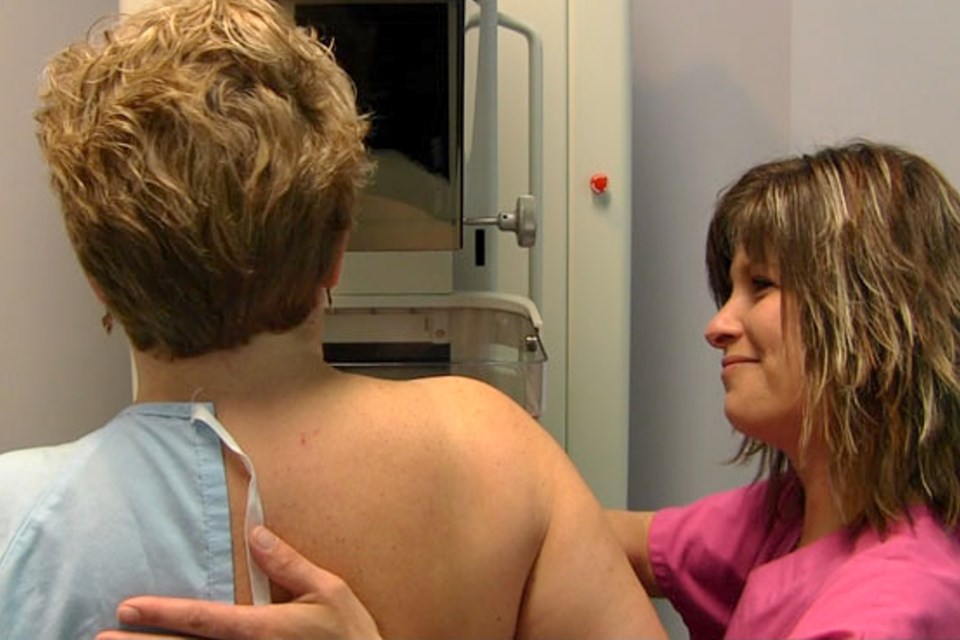The COVID-19 pandemic has meant that thousands and thousands of Ontario women were not able to go for mammograms and screen for breast cancer in the past two and a half years. The result, said the Ontario Medical Association (OMA) was the discovery of more women having advanced cases of cancer once they did their screening.
The association said the numbers of mammograms and breast cancer screenings are now returning to normal but also said there is a worry there are still many more breast cancer screenings that have not been done.
During an online news conference held Wednesday, OMA president Dr. Rose Zacharias said an analysis of OHIP bill data found that an astonishing number of breast screening appointments were not done that could have been done.
"A new analysis by the Ontario Medical Association found there were 422,000 fewer mammograms conducted during the pandemic than would have been conducted based on historical records," she said.
"And although screenings have returned to forecasted levels, many women still haven't had a mammogram since before March 2020. Experts worry that this means there are undiagnosed cases of breast cancer yet to show up," Zacharias continued.
"Breast cancer patients are waiting longer for treatment than they were before the pandemic and this includes their surgeries. longer wait times can have negative effects as you can imagine, physically, but mentally, emotionally and psychologically."
"In terms of possible solutions, Zacharias said Ontario needs a multi-faceted approach. She said Ontario has to address the shortage of physicians, especially family doctors. This would include more approvals for foreign-trained physicians. She also spoke of the need for Ontario to create Integrated Ambulatory Care centres to treat non-emergency medical issues.
Zacharias said the OMA also supports the increase in the number of eligible spots available at Ontario medical schools as well as the increase in the number of training residencies open to newly graduated MDs.
One of the speakers at the online news event was Dr. Jean Seely, a radiologist in Ottawa who is also the president of the Canadian Society of Breast Imaging.
She said doctors are now seeing more cases of breast cancer being discovered by women who have symptoms of breast cancer as opposed to finding the cancers early on, by screening. Seely said screening means that cancers are discovered in Stage 0 or Stage 1.
"This would require less intensive breast surgery and chemotherapy," Seely said. She added that any delay in screening will lead to poorer outcomes for patients.
"And when we have breast cancer diagnosed at an early stage zero or one, the five year survival is 98 per cent," Seely said.
"When it's diagnosed at stage two, it decreases to 80 to 88 per cent. And when it's diagnosed at stage three, it drops further to 77 per cent. When it's diagnosed at stage four at diagnosis, it has a survival rate between 20 and 39 per cent. Very, very difficult."
Also commenting Wednesday was Dr. Erin Cordiero, a breast cancer oncologist at the Ottawa Hospital who spoke about the stress and strain being experienced by physicians and surgeons largely because of the shortage of so many different types of health care professionals.
"With regards to breast surgical oncology, we're really noticing a significant decrease in the access that we have to our resources, and specifically to operating room time. Mostly this is due to shortage of healthcare personnel and human resource constraints," Cordiero said.
She added that a key concern working with breast cancer patients is the amount of time waiting to get procedures and treatments and how this weighs heavily on the patients.
"This time waiting for testing and surgery is obviously incredibly stressful for patients and their families. And compounding this issue is also the backlog that we have of postponed surgeries from the past two and a half years. Because of our current resource limitations, we're actively prioritizing patients with cancer to try to get them done as soon as possible."
She said in addition to the stress endured by families, a similar situation has occurred in the medical community where more physicians are experiencing burnout.
The aspect of time and delays in dealing with breast cancer is of significant concern according to Dr. Tim Hanna, a staff physician at the Kingston Health Sciences Centre, a radiation oncologist and associate professor at Queen's University Cancer Research Institute.
He told the news conference that shorter waits for treatment translate into better outcomes for breast surgery and any chemotherapy the patient needs.
"For example, in our research published in the British Medical Journal, we found that a four-week delay of breast cancer surgery was associated with a one-per-cent-worse mortality. This means that for 1,000 women waiting for breast cancer surgery, there will be 10 deaths due to the extra wait. The longer wait for treatment, the worse the impact on survival.”
Hanna said the same pattern applies to other cancers such as cancers of the colon, rectum, cervix, head and neck and bladder.
In her comments wrapping up the news conference, Zacharias said the need to resolve the wait time issues for cancer screening and treatment is urgent.
"I can't stress that enough, but the urgent need is to fix the cracks in our healthcare system that have been exposed by three years of living with the pandemic. There were some cracks before but we call them chasms now."
She also urged every Ontario woman aged 40 and older to get screened for breast cancer.
Zacharias said she has never seen such an extreme situation such as the shortage of doctors and other health care workers. She added that while she has been an emergency room doctor for 20 years, she never believed she would see the day that emergency rooms would be closing in Ontario.
Len Gillis covers health care and mining for Sudbury.com.
